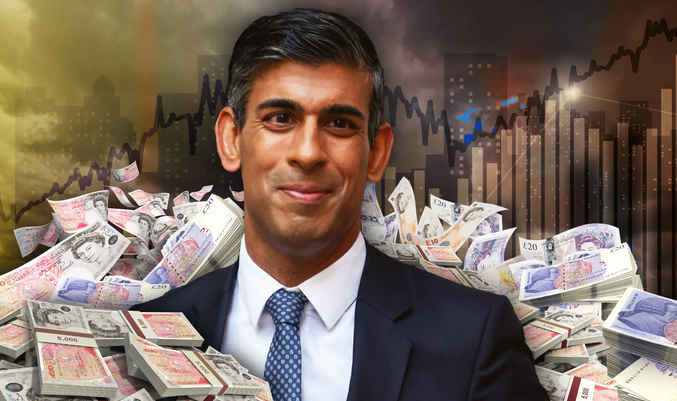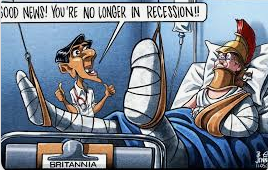We need to talk about Rishi

How Britain’s banking class captured our politics via one grinning Goldman Sachs intern in Prada shoes
We need to talk about Rishi. Not just because he was a piss poor Prime Minister with the charisma of a frozen croissant, but because he represents something far more corrosive: the unholy marriage of banking and politics. He didn’t just waltz into Westminster from Goldman Sachs, he rode in on the back of the 2008 financial crash, one of the greatest heists of the modern era, and profited from it. While millions were losing their homes and pensions, Sunak was working for a hedge fund that made vast sums betting on the collapse of the global economy. This is the man the Tories, and the markets, decided to hand the keys to No.10. A technocratic face for corporate power. A crash profiteer turned Chancellor. Britain’s very own grinning Dracula in Prada shoes.
TetleysTLDR Snapshot
| Detail | Info |
| Role | Part-time senior adviser at Goldman Sachs |
| Salary | Donated to The Richmond Project |
| Restrictions | 1-year ban on lobbying & government advising |
| Revolving Door | Continues unbroken path from Goldman → politics → Goldman |
From Goldman to Government
Sunak cut his teeth at Goldman Sachs, the Wall Street vampire squid that played a central role in the 2008 global financial crisis. Goldman was knee-deep in the mortgage-backed securities racket, selling dodgy assets to investors while secretly betting against them knowingly. In 2010, the SEC fined Goldman $550 million for securities fraud related to these exact practices [1].
That was the environment in which Rishi Sunak was forged. He wasn’t some junior back-office clerk: he was an analyst in a firm infamous for cooking up the toxic financial derivatives that blew a hole in the global economy.
That alone should’ve raised red flags when he entered Parliament in 2015, but in our broken system, where City boys are treated as policy savants rather than architects of disaster, it didn’t matter.
Betting against the crash
After Goldman, Sunak joined the hedge fund The Children’s Investment Fund (TCI), run by the notorious Sir Chris Hohn. TCI didn’t just gamble with the markets, they bet against them. During the 2008 crash, TCI reportedly made hundreds of millions by shorting financial stocks [2]. Sunak was there during this period, fiddling while the rest of the world burned.
TCI also played a major role in the aggressive shareholder activism that destabilised national economies. In 2007, the fund pressured Dutch bank ABN Amro into selling itself off, a move which contributed directly to the collapse of RBS and forced a £45 billion UK government bailout [3]. One of the biggest casualties of the crash, caused in part by Sunak’s firm.
So, let’s be crystal clear here: Sunak wasn’t some bystander. He was a vampire: part of a system profiting from collapse. When the global economy imploded, he made money. When austerity hit, we paid the price. And when the smoke cleared, he walked into Parliament and got to work protecting the very interests he once served.

The revolving door swings open
Sunak is the poster boy for the revolving door between finance and government. The Treasury under him became a front office for the City, obsessed with credit ratings, market stability, and placating bondholders not the public. His COVID-era furlough scheme, often cited as his one ‘good’ policy, was less radical than people think, it merely prevented economic collapse while keeping the workforce tethered to employers. He slashed Universal Credit, delayed meaningful energy price interventions, and refused to tax non-doms (his own wife among them) until public pressure made it politically untenable.
Even as inflation soared and real wages collapsed, Sunak’s response was always the same: calm the markets. Calm the markets. Always the markets.
His so-called ‘long-term economic plan’ was little more than reheated Osborne-era dogma, with new branding. Pay restraint, low corporate tax, minimal regulation, and trickle-down economics under the fig-leaf of ‘tech optimism’. Nothing about redistributing wealth, fixing broken public services, or taxing the super-rich. Because how could he? He is the super-rich.
Not incompetent, just not on your side
People keep calling Sunak incompetent. That’s not quite right. Yes his premiership was a train crash, but on whose terms? For the corporate class, the banks, the tax-dodgers, the hedge funds? He did just fine, he was their man on the inside. When he smirked through the cost-of-living crisis, he wasn’t out of touch. He was laser-focused on a different constituency: the investment community. When he failed to deal with NHS backlogs, school underfunding, and rampant homelessness, it wasn’t oversight, it was ideology. The free market will sort it out. The public sector is a cost centre. And besides, who needs hospitals when there’s private equity in the wings?
He even bragged, in a leaked 2022 recording, about reversing funding from ‘deprived urban areas’ to richer places like Tunbridge Wells [4]. That wasn’t a gaffe: it was an honest glimpse of his worldview. He serves wealth, not need.
Sunak’s return to Goldman Sachs
Goldman Sachs announced on 8 July 2025 that former Prime Minister Rishi Sunak will re-join the firm as a senior adviser, returning to the place he began his finance career in the early 2000s as an intern and analyst Omni Ekonomi+15The Wall Street Journal+15Business Today+15.
He’ll serve part-time, while continuing as an MP, and donate his Goldman salary to The Richmond Project, the numeracy charity he co-founded NewsBytes+7The Wall Street Journal+7BBC News Feeds+7.
Goldman CEO David Solomon emphasised Sunak’s ‘unique perspectives’ on macroeconomic and geopolitical issues, saying he’ll advise global clients and contribute to internal learning efforts BBC News Feeds+12Goldman Sachs+12Fortune India+12.
Conflict of interest rules & safeguards
The Advisory Committee on Business Appointments (ACOBA) has imposed strict limitations:
- A one-year cooling-off period before he can start.
- No lobbying on behalf of Goldman.
- He must not advise governments, sovereign wealth funds, or overlap with clients/areas he managed as PM Goldman Sachs+12GOV.UK+12b2bnews.co.nz+12The TimesBBC News Feeds.
Why this appointment matters
- The revolving door in action
Sunak’s return is a textbook example of the ‘revolving door’ between high finance and government, mirroring pension-era moves by Cameron, Blair, Osborne, and Javid NewsBytes+5The Wall Street Journal+5Business Today+5.
- Signalling strategic influence
Goldman is clearly positioning itself for geopolitical and macroeconomic risk advisory something Sunak’s premiership (Brexit, Ukraine, inflation) uniquely equips him for AInvest.
- Public pay: private gain?
He has indicated his income from Goldman will go to charity, but this is a bit of a red herring because as a man who is more wealthy than the King, he doesn’t need the money. That’s not what he’s there for. The question therefore remains: how will this influence power dynamics between City and State? The optics of a former PM back at a bank he once bet against during the 2008 crash are troubling, not to mention the potential for soft influence, even without overt lobbying.
Public Reaction
Reddit users were quick to mock the move:
“Rishi rich worked for Goldman Sachs, directly helping engineer the 2008 financial crash and wants to keep expanding bankers handouts. They don’t care if they destroy the country…”Outlook Business+8CNBC+8Reddit+8Reddit
And it’s more than a joke, this hire embodies the seamless integration of political authority and financial power, reinforcing the narrative of elite capture.

Rishi Sunak, the man richer than the King who once said I have no working class friends
Future paydays incoming
Sunak isn’t finished. It was always envisaged that he’d end up on the board of a venture capital firm, a hedge fund, or some global AI consultancy milking NHS data. Like George Osborne before him (now at BlackRock and chair of the British Museum), or David Cameron (remember Greensill Capital?), Sunak will cash in. That’s what this whole game is about: build political capital, then spend it on private gain.
The Bigger Picture: Systemic Capture
Sunak isn’t an aberration, he’s the inevitable outcome of a system where financial capital controls political power. A system where hedge fund managers bankroll parties, ex-ministers walk straight into lobbying jobs, and the line between Treasury and trading floor is blurred beyond recognition.
Of course this isn’t just about Tories. Labour’s front bench is increasingly filled with ex-consultants, bankers, and private equity-friendly ‘moderates’. The entire political class has been infected. If you want to see where Britain’s democracy went to die, look no further than the revolving door between Whitehall and the City.

Time to Shut the Door
We need more than a change of government: we need a change of system. That means:
- A mandatory five-year cooling-off period before ministers can take up private sector roles
- Full transparency on lobbying and party donations
- A ban on MPs and peers holding second jobs in finance
- A public inquiry into political profiteering from the 2008 crash and its aftermath
And we need to tell the truth about Sunak: that he wasn’t a failed leader so much as a successful operator in a failed system. He came, he served capital, and he’ll leave richer than ever. Let’s make sure the door shuts behind him, and stays shut.
Sources
- U.S. Securities and Exchange Commission (2010). Goldman Sachs to Pay Record $550 Million to Settle SEC Charges. https://www.sec.gov/news/press/2010/2010-123.htm
- The Guardian (2020). Rishi Sunak’s hedge fund profited from financial crash.
https://www.theguardian.com/politics/2020/feb/21/rishi-sunak-hedge-fund-profited-financial-crash - Financial Times (2008). TCI’s role in ABN Amro break-up. [Archived]
- The New Statesman (2022). Rishi Sunak caught on camera boasting about taking money from deprived areas.
https://www.newstatesman.com/politics/2022/08/rishi-sunak-video-deprived-areas
A bit of shameless self-plugging here. This is www.TetleysTLDR.com blog. It's not monitised. Please feel feel to go and look at the previous ones on the website and if you like them, please feel free to share them.

